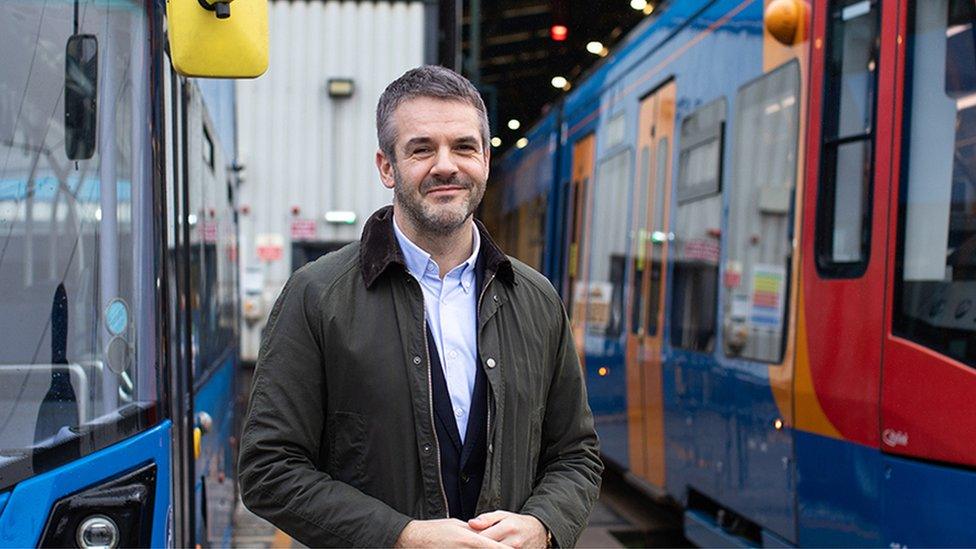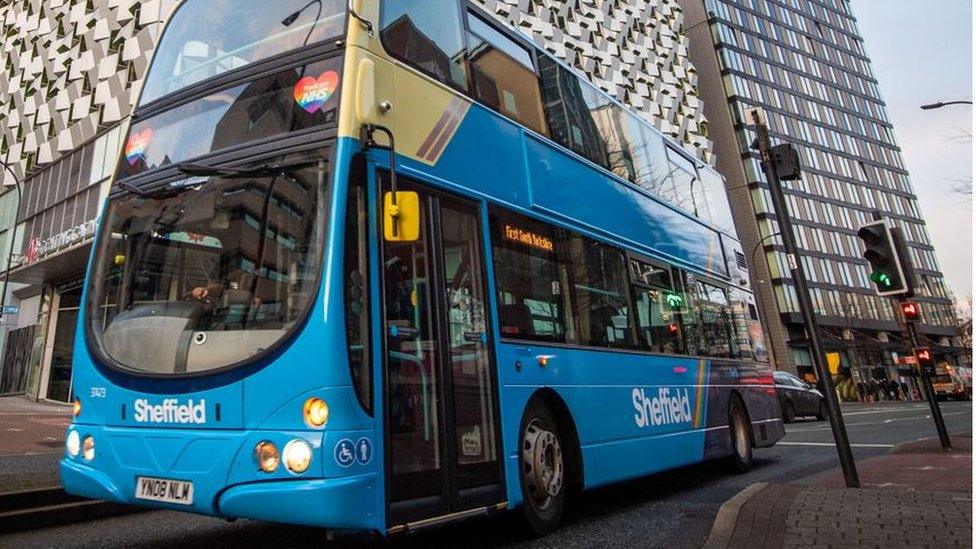Bus franchising recommended for South Yorkshire network
- Published

The mayor believes franchising will improve the bus network
South Yorkshire's mayor has said bus franchising has been recommended as the best way to improve the county network.
It would mean the South Yorkshire Mayoral Combined Authority (SYMCA) would decide services and timetables.
Mayor Oliver Coppard said the estimated cost of the whole transition to franchising would be £25m.
First Bus said it was confident it could help deliver change. Stagecoach said it was committed to working with SYMCA to make the network successful.
Bus services in England outside London were deregulated in 1986, enabling private operators to control routes, timetables and fares and to receive the revenue from fares.
However, the Bus Services Act gave city regions the power to introduce bus franchising in 2017.
Mr Coppard said an independent audit had looked at different options for the bus network in South Yorkshire and had recommended franchising.
He said he hoped it could be introduced by the end of this year.
"Franchising would be a publicly-controlled bus system where we decide what the routes, fares and timetables look like and we would use the money from the profitable bits of our network to reinvest in those vital services in other parts of our communities," he said.


Analysis by Lucy Ashton, BBC Radio Sheffield political reporter
South Yorkshire was announced as home to the UK's first Investment Zone, but only 1% of local people can get there on public transport within 30 minutes.
The Advanced Manufacturing Research Centre gives young people some of the best training in the world, but students struggle to catch a bus there.
Unreliable buses infuriate passengers and Oliver Coppard knows there are wider, serious economic repercussions for the region as well.
Appropriately, he made the franchising announcement from his office directly opposite the bus interchange.
But it won't be an easy ride.
The fleet is old, most buses are over 11 years old in South Yorkshire and they only tend to last 15 years.
A new electric bus costs £400,000 and its £250,000 for a diesel bus.
The mayor will need to invest in new vehicles, set affordable fares, reinstate routes, make services reliable and most importantly, rebuild people's faith and encourage them back on the bus.

Under franchising, the SYMCA would contract with private bus operators to run the services it had set and Mr Coppard said they would work with those companies.
"I want bus companies to invest in South Yorkshire, I want them to invest in bus networks and to work with us on things like integrated ticketing," he said.
"What we don't have at the moment is the control that I would like. We've been upfront with the bus companies about what we're hoping to do with this franchising process and I hope they will now support us in these decisions."
Council leaders are due to approve the move at a meeting on 12 March and there will then be a 12-week public consultation.
First Bus said its latest surveys showed eight out of 10 passengers in South Yorkshire were satisfied with its bus service.
Managing director Zoe Hands said: "We are confident that in areas where authorities choose to progress with franchising, we can use our decades of experience delivering high-quality bus services to support them as a partner of choice."
The Confederation of Passenger Transport, on behalf of Stagecoach, said operators were committed to working with SYMCA to make the future of the network as successful as possible.
Chief executive Graham Vidler said: "Regardless of the regulatory model, passengers will benefit most from investment in bus priority measures and better coordination of roadworks.
"These are actions which will reduce congestion, speed up journey times, keep fares low and ensure buses are reliable - factors we know are vital for passengers and the popularity of bus travel."

Follow BBC Yorkshire on Facebook, external, X (formerly Twitter), external and Instagram, external. Send your story ideas to yorkslincs.news@bbc.co.uk, external.
Related topics
- Published1 November 2023

- Published17 August 2023
